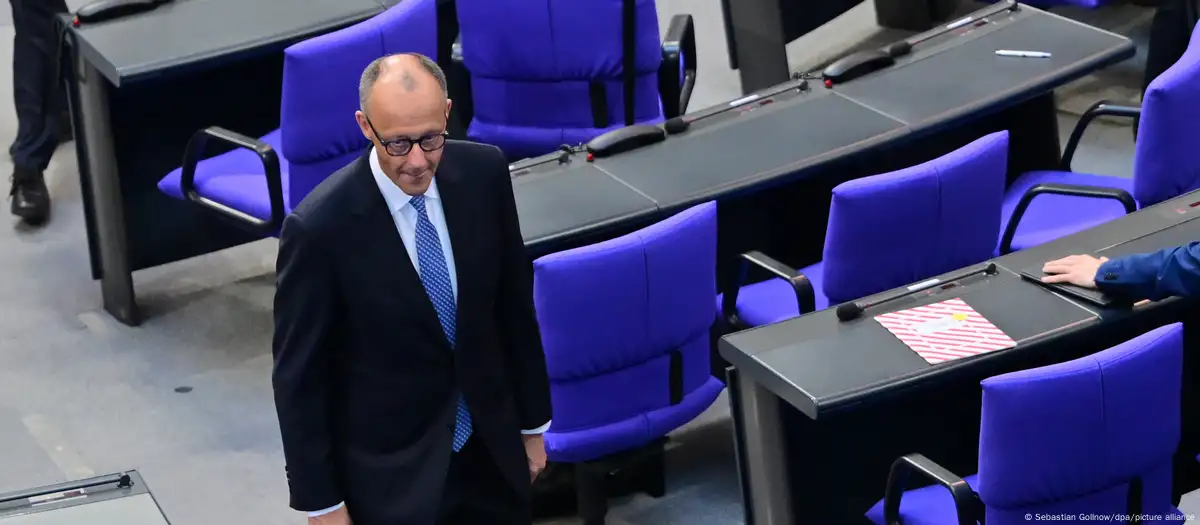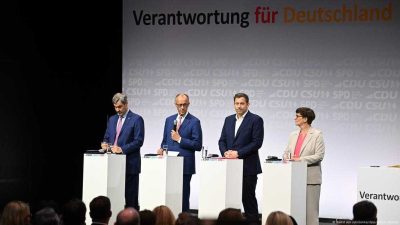
For the first time in postwar German history, a federal chancellor candidate does not get the minimum number of votes in the first round of the vote in Parliament. Result exposes crack in the new government coalition.
Conservative Christian Democratic Union (CDU), Friedrich Merz, did not get the necessary number of votes to be elected German’s next federal chancellor in the first round of the German Parliament (Bundestag) on Tuesday (05/06). The politician received 310 favorable votes, six less than required to reach the absolute majority.
This is the first time in postwar German history that a federal chancellor candidate is not elected in the first round of voting at Bundestag. The parliamentary election is seen as a formality, as it usually happens only after the candidate wakes up a coalition with other parties that guarantee him the absolute majority.
With 630 seats in Parliament, Merz needed 316 votes to assume the leadership of the government. However, only 310 legislators voted in favor, 307 were against, three abstained and one had the vote considered invalid. Nine votes were not computed for absence.
The result exposes a crack within the newly created “red-red” coalition negotiated between the CDU, its Bavarian arm, the Christian Social Union (CSU) and the Federal Democratic Social Party (SPD), the federal chancellor that leaves office, Olaf Scholz. Together, the acronyms have 328 seats in Bundestag, 12 more than necessary to bring Merz to power.
This means that members of the block itself that did not endorse Merz. The collapse of a coalition is precisely the indicative that the government has no parliamentary support. This is what motivated Scholz to summon the early elections in February that gave CDU victory, for example.
What happens now?
According to the Federal Constitution of Germany, legislators now have 14 days to elect a chancellor with an absolute majority. In this second phase of the process, several rounds of voting may occur in an attempt to reach the necessary number of votes.
If no candidate reaches the absolute majority within the period, the third phase of the process begins. In it, those who obtain most of the votes are elected, which means the formation of a minority government. In this case, German President Frank-Walter Steinmeier would then have the options to formally appoint the victor as federal chancellor or choose to dissolve Bundestag and perform new elections.
In principle, alternative candidates could be indicated at any time. However, parties reject the inclusion of the Alternative Ultra-Development for Germany (AFD) in a coalition, which makes the union between conservatives and social democrats the only one that could command a parliamentary majority. The proposal of any other name would also require extensive renegotiation, possibly involving a third party, such as the Greens, which would require their own concessions.
According to German television station ARD, CSU’s Bundestag president Julia Klöckner intends to guide the second round of the vote on Wednesday. After Merz’s defeat, the parties that form the new coalition gathered to evaluate the next steps.
Merz depends on vows of social democrats
Merz’s CDU-CSU conservative block won the national elections in February, but with 28.5% of the votes. The party leader then agreed to form a coalition with social democrats, who obtained only 16.4%, his worst result in German postwar history. The goal would be to avoid a hit with AFD, which was second in the election.
The agreement with the SPD, which received the endorsement of social democrats affiliated to the acronym on Monday, has 144 pages and indicates a hardening of laws and procedures on immigration, policies that contrast with those led by Scholz in the last three years.
Result Exposes Racha in the newly created Coalition between Conservatives and Social Democrats | Halil Sagirkaya/Anadolu/Picture Alliance
The text was designed despite a troubled electoral process, with Merz doing harsh criticism of the social democratic government’s immigration and economy policies.
The election came after two attacks on the knife – in Solingen and Aschaffenburg – and a mass run -over in Magdeburg, which stretched the already heated debate on immigration in the country.
The CDU leader, already called “Ultra-Conservative”, renewed promises to squeeze the siege against unquenchant immigrants and passed a motion in support of a controversial anti-immigration project with support from AFD.
With this, Merz was accused of breaking the sanitary cord against the ultra -right since he had been held since World War II, and was the target of frequent criticism of SPD politicians.
SPD says he is not responsible for the result
SPD colleyman Lars Klingbeil told the German news agency DPA that all his party legislators were present in the vote and that the subtitle is not guilty of the lost votes. Klingbeil added that he has no reason to believe that his party’s paintings did not vote for Merz.
“The vote [registrado] Of 85% of members is an obligation for the party, and he fulfilled him, ”he said.“ We are reliable, ”he added. Klingbeil would take over as Vice-Chancellor in the event of Merz’s victory.
Despite composing the opposition to the future government, Green President Franziska Brantner said he was not satisfied with the failure of the vote, due to the sign of political instability that this goes through. “We want a government capable of acting for Europe and Germany,” he said. “Now they need to demonstrate that they are able to do this, even in the next four years,” he continued.
 Coalition Agreement was approved by the parties and signed last Monday Bernd von Jutrczenka/DPA/Picture Alliance
Coalition Agreement was approved by the parties and signed last Monday Bernd von Jutrczenka/DPA/Picture Alliance
AFD celebrates voting failure
AFD celebrated the failure of the vote. The Alice Weidel Party’s colicer stated that the results showed the fragility of the new federal coalition. “This shows the weak base on which the small coalition of CDU/CSU and SPD is built, which was rejected by citizens,” he wrote in X.
For AFD parliamentary group secretary Bernd Baumann, Merz “paid the price for all his previous machines.” After closing a coalition agreement with social democrats last month, Merz annoyed the opposition by forcing a constitutional reform in Parliament and spending a superpack of spending that would allow his future government to increase public debt to investment in defense and infrastructure.
Despite this, AFD said it will not try to obstruct the next round of voting.
 Parliamentary vote is secret | Lisi Niesner/Reuters
Parliamentary vote is secret | Lisi Niesner/Reuters
What explains Merz’s unpopularity
Merz’s popularity has been falling between his electoral base. In a survey by public broadcaster ZDF, about 73% of Germans agreed that the federal chancellor candidate had fooled voters by passing the unprecedented spending superpack for his future government.
The increase in public debt had been expressly discarded by him during the election campaign. Among those who lost confidence in the conservative leader, 44% were supporters of CDU/CSU.
In addition, the 69 -year -old politician also accumulates disaffected within his own party. Merz joined CDU still in his teens. Graduated in law, he even served as a judge before applying for elective positions. Premiered as MEPSPutated in 1989. In the following decade, he was elected to the German Parliament.
However, Merz became a fierce rival of the then German chancellor Angela Merkel, critic of his refugee opening policy. He ended up leaving Parliament in 2009, four years after Merkel took power and began to work in international law firms and corporate advice, including the German branch of TriLionaire Blackrock, the world’s largest asset manager.
With Merkel’s retirement in sight, he returned to the party in 2018 and gradually won land until he returned to Parliament in 2021 and assumed the leadership of the acronym. Since then, he has taken the right party to the right, and commanded the opposition to Scholz in the last three years.
Originally published by DW on 06/05/2025
Source: https://www.ocafezinho.com/2025/05/06/merz-sofre-derrota-inedita-em-votacao-para-chanceler-federal/

